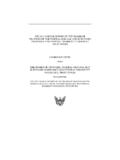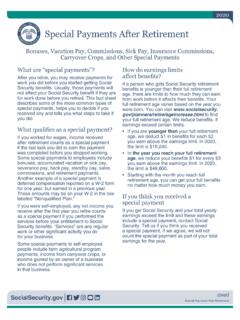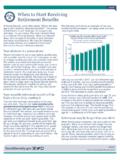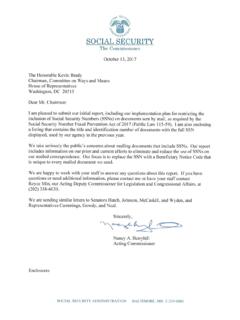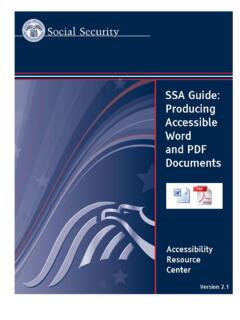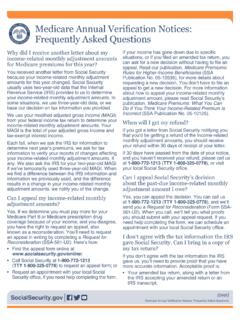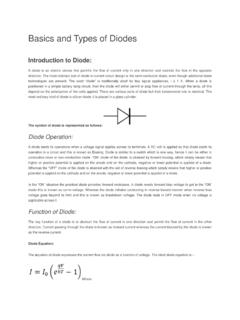Transcription of reverse - The United States Social Security Administration
1 Chapter Social Security APPEALS When applicants for Social Security and SSI- benefits are not satisfied with the initial decision on their claims, they may request a reconsideration by the agency that made the initial decision: the State agency in disability the Social Security Administration in all other cases. The case is reviewed by a person who did not participate in the original decision. Applicants who are dissatis fied with the reconsideration decision are entitled to a hearing before an Administrative Law Judge (ALJ). A large majority of all hearings concern claims for disability benefits.
2 At that hearing, the Administrative Law Judge is obligated to protect the interests of both applicant and government and has au thority to uphold, modify or reverse the claim denial. If the denial is upheld, the case may then be reviewed, at the applicant s request, by the Appeals Council, an independent review group attached to the Office of Hearings and Appeals of the Social Security Administration . If the Council upholds the Administrative Law Judge s decision, or refuses to review the case, the applicant may request judicial review in a District Court. Federal court decisions are based solely on the factual record developed at the earlier stages.
3 The courts may affirm, This description applies to and SSI claims. Appeals under Medicare Hcspitai program are discussed in Chapter 13. The Commission has no recommendations concerning Medicaid appeals. For a description of the role of the State agency in the disability adjudication process, see Chapter 9. 218 modify, or reverse the earlier decision or send it back to the ALJ or the Appeals Council for further consideration. About one-half of district court cases are remanded to the Social Security tion. The effect of such a remand is usually a finding in favor of the applicant.
4 In the course of its work, the became concerned about the way the appeals process works in practice and the burden it places on applicants. Many appeals might have been avoided had the claims for disability, in particular, been better developed prior to the hearings stage. The Commission is recommending a change which it hopes will improve this by increasing the number of specialized personnel However, even if this is done, significant numbers of claims denials and benefit reductions will still be appealed. The Commission recognizes that many claimants have degenerative diseases that may have worsened by the time their claims reach the hearings level.
5 As a result, it is expected that some claims will be allowed by even when there has been adequate development at the initial stages. The Commission, therefore, recommends changes in the appeals process designed to improve the development of evidence prior to hearings, to encourage the development of a uniform body of precedential materials, and to improve the quality of hearings deci sions generally. Pre-Hearing Conferences for Disability Applicants The Commission recommends that or their designees be reauired to hold a ore-hearina conference with the claimant if the claimant requests it and is represented.
6 Improved development of See page 214, Chapter 9. the case before the hearing can reduce the number of cases in which a full hearing will be needed and can expedite proceedings in Under present practices, Administrative Law Judges frequently base decisions on medical evidence developed at or after the hearing or on their own evaluation of the applicant s condition at the hearing. The Commission believes that better pre-hearing development of the evidence can expedite the adjudication process by insuring that medical issues are fully documented before the hearing date. A few Administrative Law Judges do have conferences with claimants and their representatives before the hearing.
7 This practice should be mandatory when the applicant requests it. The Commission cautions that pre-hearing interviews are inappropriate when the applicant is not represented. Unrepresented applicants may be intimidated at a conference into withdrawing a valid claim before the hearing itself, or fail to understand that they may be required to attend a full hearing at a later date. Consultative Examinations for Disability Applicants The Commission recommends that disability applicants be informed of their right to have treating physicians comment on the findings of consultative examinations.
8 Consultative examinations can be requested Mashaw, Jerry L., et al., Social Security Hearings and Appeals, Heath and Company, Lexington, Massachusetts, 1978, p. 64. Mashaw concludes from random interviews with Administrative Law Judges that percent of appealed claims might be approved on the record without further development, Judges are unwilling to approve them without conferences with claim-ants. Also, Administrative States , Recommendation 78-2, Procedures for Determining Social Secur ity Disability Claims. by the State agency which makes the initial disability determination, by the Administrative Law Judge, or by the Appeals Council.
9 They are made by physicians who have had no prior contact with the . applicant. The Commission believes that when a consultative examina tion is ordered, applicants should always be informed in writing that they have the right to request that the comments of their treating physicians on the findings of the examination be solicited by the government. Where an applicant may have been treated by more than one physician for the condition for which the consultative examination was ordered, it is appropriate to contact them all. Physicians should be encouraged to meet the request even though their response is v Uniform Precedents in Disability Adjudications The Commission recommends wider distribution of precedential materials.
10 The Commission is concerned about the high percentage of appealed cases in which the courts have reversed Administrative Law Judges decisions. The Social Security appeals process does not The Social Security Disability Amendments of 1980 (Public Law 96-265) authorize the Office of Hearings and Appeals to pay physicians and other potential sources of medical evidence for information already in existence in cases where an application for Disability Insurance benefits is filed. (Payment authority was already available for informa tion on SSI claims.) Because it is not clear that this provision will cover payment for comments by treating physicians requested after a consultative examination, the Commission suggests that payment author ity be extended to cover such comments.
